The Role of Ticketing Analytics in Enhancing Waste Reduction Initiatives at Cricket Stadiums
99 exch sign up, lotus 365.io, play exch.in: Cricket stadiums around the world are known for hosting large crowds of passionate fans who come together to watch their favorite teams in action. With such gatherings comes a great responsibility to ensure that waste generated during matches is managed effectively. Ticketing analytics can play a significant role in enhancing waste reduction initiatives at these stadiums.
Understanding Fan Behavior
One of the key ways in which ticketing analytics can help in waste reduction is by providing insights into fan behavior. By analyzing data related to ticket sales, attendance numbers, and seating preferences, stadium management can gain a better understanding of the types of fans that are attending matches. This information can then be used to tailor waste reduction initiatives to suit the needs and preferences of these fans.
Tracking Concession Sales
Another important aspect of waste reduction at cricket stadiums is the management of food and beverage waste. Ticketing analytics can be used to track concession sales and identify trends in the types of food and drinks that are being purchased by fans. This information can help stadium management to optimize their inventory and reduce the amount of food waste generated during matches.
Promoting Sustainable Practices
Ticketing analytics can also be used to promote sustainable practices among fans. By providing data on the environmental impact of different ticket options, such as electronic tickets versus paper tickets, stadium management can encourage fans to make more sustainable choices. Additionally, by offering incentives for recycling or using reusable cups and containers, stadiums can further reduce waste generation.
Monitoring Waste Management Efforts
Once waste reduction initiatives have been implemented, ticketing analytics can be used to monitor their effectiveness. By tracking metrics such as waste diversion rates, recycling rates, and overall waste generation, stadium management can identify areas for improvement and make data-driven decisions to enhance their sustainability efforts.
Promoting Fan Engagement
Finally, ticketing analytics can be used to promote fan engagement in waste reduction initiatives. By providing fans with information on the environmental impact of their actions, such as recycling a plastic bottle or choosing a vegetarian meal over a meat-based option, stadiums can empower fans to make more sustainable choices while attending matches.
In conclusion, ticketing analytics play a crucial role in enhancing waste reduction initiatives at cricket stadiums. By understanding fan behavior, tracking concession sales, promoting sustainable practices, monitoring waste management efforts, and promoting fan engagement, stadiums can significantly reduce their environmental footprint and create a more sustainable sporting environment.
—
FAQs
Q: How can ticketing analytics help in reducing food waste at cricket stadiums?
A: Ticketing analytics can track concession sales and identify trends in food and beverage purchases, enabling stadium management to optimize inventory and reduce food waste.
Q: What are some examples of sustainable practices that can be promoted using ticketing analytics?
A: Examples include offering incentives for recycling, promoting the use of electronic tickets, and encouraging fans to use reusable cups and containers.
Q: How can ticketing analytics be used to monitor the effectiveness of waste reduction initiatives?
A: By tracking metrics such as waste diversion rates, recycling rates, and overall waste generation, stadium management can identify areas for improvement and make data-driven decisions to enhance sustainability efforts.







